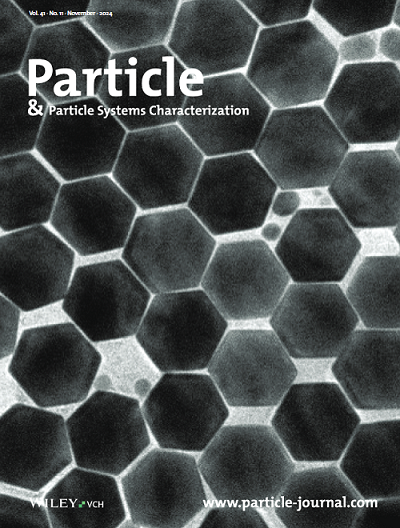Dual-Emission Fluorescent Carbon Dots Grafted by Rhodamine-B for Selective Detection of Iron Ion and Bioimaging in Cell
IF 2.7
4区 材料科学
Q3 CHEMISTRY, PHYSICAL
引用次数: 0
Abstract
Rhodamine-B grafted carbon dots (RhB-CDs) with double emission fluorescence are developed , one of which has excitation dependence, while the other have not. The prepared RhB-CDs have good dispersibility, uniform spherical shape, and excellent water solubility. They could be used to specifically detect Fe3+ ions in an aqueous solution with the detection limit of 1.1 × 10−6 m and with good anti-interference ability, because Fe3+ ions are easier to combine with hydroxyl groups on the surface of RhB-CDs to form aggregates (such as ferric hydroxide) than other metal ions, which lead to the fluorescence quenching of RhB-CDs. Fe3+ ions not only quench the fluorescence intensity of both double emission peaks of RhB-CDs, but also change the relative fluorescence intensity of these two fluorescence emission peaks. Therefore, two different fluorescence analysis methods are used to specifically identify iron ions and the results are consistent with each other. At the same time, the double emission fluorescent RhB-CDs have low hemolysis rate and cytotoxicity, indicating that RhB-CDs do little harm to cells and are further used to detect Fe3+ ions in cells through fluorescence bioimaging. All of the above indicates that the prepared RhB-CDs would have potential application value in detecting iron ions in blood and cells.

罗丹明-B 接枝的双发射荧光碳点用于选择性检测铁离子和细胞生物成像
本研究开发了具有双发射荧光的罗丹明-B 接枝碳点(RhB-CDs),其中一种具有激发依赖性,而另一种则不具有激发依赖性。所制备的 RhB-CDs 具有良好的分散性、均匀的球形和优异的水溶性。与其他金属离子相比,Fe3+ 离子更容易与 RhB-CD 表面的羟基结合形成聚集体(如氢氧化铁),从而导致 RhB-CD 的荧光淬灭。Fe3+ 离子不仅淬灭了 RhB-CDs 两个双发射峰的荧光强度,而且还改变了这两个荧光发射峰的相对荧光强度。因此,使用两种不同的荧光分析方法来特异性地识别铁离子,结果是一致的。同时,双发射荧光 RhB-CD 具有较低的溶血率和细胞毒性,表明 RhB-CD 对细胞的伤害很小,可进一步用于通过荧光生物成像检测细胞中的 Fe3+ 离子。综上所述,制备的 RhB-CDs 在检测血液和细胞中的铁离子方面具有潜在的应用价值。
本文章由计算机程序翻译,如有差异,请以英文原文为准。
求助全文
约1分钟内获得全文
求助全文
来源期刊

Particle & Particle Systems Characterization
工程技术-材料科学:表征与测试
CiteScore
5.50
自引率
0.00%
发文量
114
审稿时长
3.0 months
期刊介绍:
Particle & Particle Systems Characterization is an international, peer-reviewed, interdisciplinary journal focusing on all aspects of particle research. The journal joined the Advanced Materials family of journals in 2013. Particle has an impact factor of 4.194 (2018 Journal Impact Factor, Journal Citation Reports (Clarivate Analytics, 2019)).
Topics covered include the synthesis, characterization, and application of particles in a variety of systems and devices.
Particle covers nanotubes, fullerenes, micelles and alloy clusters, organic and inorganic materials, polymers, quantum dots, 2D materials, proteins, and other molecular biological systems.
Particle Systems include those in biomedicine, catalysis, energy-storage materials, environmental science, micro/nano-electromechanical systems, micro/nano-fluidics, molecular electronics, photonics, sensing, and others.
Characterization methods include microscopy, spectroscopy, electrochemical, diffraction, magnetic, and scattering techniques.
 求助内容:
求助内容: 应助结果提醒方式:
应助结果提醒方式:


